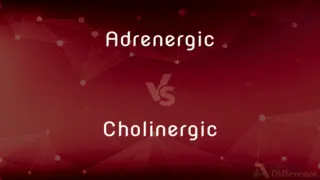Ether vs. Aether — What's the Difference?
By Urooj Arif & Fiza Rafique — Updated on April 7, 2024
Ether is a class of organic compounds, while Aether refers to the classical element thought to fill the heavens in ancient and medieval science.

Difference Between Ether and Aether
Table of Contents
ADVERTISEMENT
Key Differences
Ether, in chemistry, denotes a group of organic compounds characterized by an oxygen atom connected to two alkyl or aryl groups. These substances are known for their volatility and distinct odors. Whereas Aether, in ancient and medieval cosmology, was believed to be a pure, fifth element that fills the universe above the terrestrial sphere, embodying the quintessence that permeates all space and heavenly bodies.
The concept of ether has practical applications in science, particularly in organic chemistry and pharmaceuticals, where ethers are used as solvents, anesthetics, and in the synthesis of various compounds. On the other hand, aether is a philosophical concept with no empirical evidence supporting its existence, primarily of historical interest in the context of the development of scientific thought.
Ether’s relevance extends into both industrial and laboratory settings, highlighting its versatility and importance in chemical processes and manufacturing. Conversely, aether's significance is found in the realms of metaphysics, literature, and the history of science, where it represents the human attempt to understand the universe's composition and the nature of light and gravity.
While ether can be detected through chemical analysis and its effects observed in medical and industrial applications, aether remains a theoretical construct, unobservable and unsupported by modern physics. This distinction underscores the transition from alchemical and speculative theories of matter to evidence-based scientific inquiry.
Today, ether is a well-defined term in chemistry, with specific criteria for classification and identification, contributing to advancements in various scientific fields. Aether, however, has transitioned from a scientific hypothesis to a symbol in literature and mythology, evoking the mystery and expansiveness of the cosmos, no longer a part of scientific terminology but a reminder of the evolution of human thought.
ADVERTISEMENT
Comparison Chart
Definition
A class of organic compounds with an oxygen atom linking two carbon chains.
Hypothetical medium thought to permeate the universe.
Field
Chemistry, Pharmaceuticals
Ancient and Medieval Cosmology, Philosophy
Applications
Solvents, anesthetics, chemical synthesis.
Theoretical understanding of light and gravity (historical).
Evidence
Empirically detectable and widely used in industry and science.
No empirical evidence; considered a philosophical concept.
Modern Relevance
Continues to be significant in scientific research and industrial applications.
Mainly of historical and cultural interest.
Compare with Definitions
Ether
Exists in various forms and structures.
Diethyl ether is a common type of ether used in laboratories.
Aether
Associated with the quintessence or fifth element.
Aether is considered the fifth element in classical philosophy.
Ether
Involved in the synthesis of other compounds.
Ether compounds play a crucial role in organic synthesis.
Aether
Theoretical medium for light and gravity.
Scientists once theorized that aether was the medium for light waves.
Ether
An organic compound used as a solvent.
Ether is commonly used in pharmaceuticals.
Aether
Symbolizes the mystery of the cosmos.
Aether in literature often symbolizes the unknown mysteries of the universe.
Ether
Has a distinct, sweet smell.
The lab was filled with the sweet smell of ether.
Aether
Ancient concept of a celestial element.
Aether was once believed to be the substance filling the heavens.
Ether
Can be used as an anesthetic.
Ether was historically used for surgical anesthesia.
Aether
Represents purity and the divine.
Aether was thought to embody the pure essence beyond Earth's corruption.
Ether
Ethers are a class of organic compounds that contain an ether group—an oxygen atom connected to two alkyl or aryl groups. They have the general formula R–O–R′, where R and R′ represent the alkyl or aryl groups.
Ether
Any of a class of organic compounds in which two hydrocarbon groups are linked by an oxygen atom.
Ether
A volatile, highly flammable liquid, C4H10O, derived from distilling ethyl alcohol with sulfuric acid, used as a reagent and solvent, and formerly used as an anesthetic. Also called diethyl ether, ethyl ether.
Ether
The regions of space beyond the earth's atmosphere; the heavens.
Ether
The element believed in ancient and medieval civilizations to fill all space above the sphere of the moon and to compose the stars and planets.
Ether
(Physics) An all-pervading, infinitely elastic, massless medium formerly postulated as the medium of propagation of electromagnetic waves.
Ether
The substance formerly supposed to fill the upper regions of the atmosphere above the clouds, in particular as a medium breathed by deities.
Ether
(by extension) The medium breathed by human beings; the air.
Ether
(by extension) The sky, the heavens; the void, nothingness.
Ether
Often as aether and more fully as luminiferous aether: a substance once thought to fill all unoccupied space that allowed electromagnetic waves to pass through it and interact with matter, without exerting any resistance to matter or energy; its existence was disproved by the 1887 Michelson–Morley experiment and the theory of relativity propounded by Albert Einstein (1879–1955).
Ether
The atmosphere or space as a medium for broadcasting radio and television signals; also, a notional space through which Internet and other digital communications take place; cyberspace.
Ether
A particular quality created by or surrounding an object, person, or place; an atmosphere, an aura.
Ether
Diethyl ether (C4H10O), an organic compound with a sweet odour used in the past as an anaesthetic.
Ether
Any of a class of organic compounds containing an oxygen atom bonded to two hydrocarbon groups.
Ether
(uncountable) Starting fluid.
Ether
To viciously humiliate or insult.
The battle rapper ethered his opponent and caused him to slink away in shame.
Ether
A medium of great elasticity and extreme tenuity, once supposed to pervade all space, the interior of solid bodies not excepted, and to be the medium of transmission of light and heat; hence often called luminiferous ether. It is no longer believed that such a medium is required for the transmission of electromagnetic waves; the modern use of the term is mostly a figurative term for empty space, or for literary effect, and not intended to imply the actual existence of a physical medium. However. modern cosmological theories based on quantum field theory do not rule out the possibility that the inherent energy of the vacuum is greater than zero, in which case the concept of an ether pervading the vacuum may have more than metaphoric meaning.
Ether
Supposed matter above the air; the air itself.
Ether
A light, volatile, mobile, inflammable liquid, (C2H5)2O, of a characteristic aromatic odor, obtained by the distillation of alcohol with sulphuric acid, and hence called also sulphuric ether. It is a powerful solvent of fats, resins, and pyroxylin, but finds its chief use as an anæsthetic. Commonly called ethyl ether to distinguish it from other ethers, and also ethyl oxide.
Ether
A colorless volatile highly inflammable liquid formerly used as an inhalation anesthetic
Ether
The fifth and highest element after air and earth and fire and water; was believed to be the substance composing all heavenly bodies
Ether
Any of a class of organic compounds that have two hydrocarbon groups linked by an oxygen atom
Ether
A medium that was once supposed to fill all space and to support the propagation of electromagnetic waves
Common Curiosities
What is ether used for in modern science?
Ether is used as a solvent, anesthetic, and in the synthesis of various organic compounds.
Why is aether no longer considered a valid scientific concept?
Aether was disproved by experiments like the Michelson-Morley experiment, showing no evidence of its existence and leading to the development of modern theories of relativity and quantum mechanics.
How did the concept of aether influence scientific thought?
The concept of aether influenced the development of theories on the nature of light, space, and gravity, eventually leading to pivotal shifts in scientific understanding.
Can ether be found in everyday products?
Yes, ethers are found in a variety of products, including pharmaceuticals and as solvents in industrial processes.
Is ether safe?
Ether can be hazardous due to its flammability and potential for abuse as an inhalant; it requires careful handling.
Did any scientists support the theory of aether?
Yes, many prominent scientists, including Isaac Newton and James Clerk Maxwell, incorporated the concept of aether into their theories before it was disproved.
What replaced the aether theory in modern physics?
The theory of relativity and the development of quantum field theories replaced the need for aether as an explanatory medium for light and gravity.
How are ether and aether pronounced?
Both words are commonly pronounced as /ˈiːθər/, although "aether" can also be pronounced as /ˈiːθɪər/ in some dialects.
Can ether be naturally occurring?
Yes, some ethers are naturally occurring compounds, found in various plants and essential oils.
Do any contemporary theories or fields of study use the concept of aether?
While no longer a part of mainstream science, variations of the aether concept occasionally appear in speculative physics theories and metaphysical discussions.
Share Your Discovery

Previous Comparison
USA vs. Canada
Next Comparison
Adrenergic vs. CholinergicAuthor Spotlight
Written by
Urooj ArifUrooj is a skilled content writer at Ask Difference, known for her exceptional ability to simplify complex topics into engaging and informative content. With a passion for research and a flair for clear, concise writing, she consistently delivers articles that resonate with our diverse audience.
Co-written by
Fiza RafiqueFiza Rafique is a skilled content writer at AskDifference.com, where she meticulously refines and enhances written pieces. Drawing from her vast editorial expertise, Fiza ensures clarity, accuracy, and precision in every article. Passionate about language, she continually seeks to elevate the quality of content for readers worldwide.












































